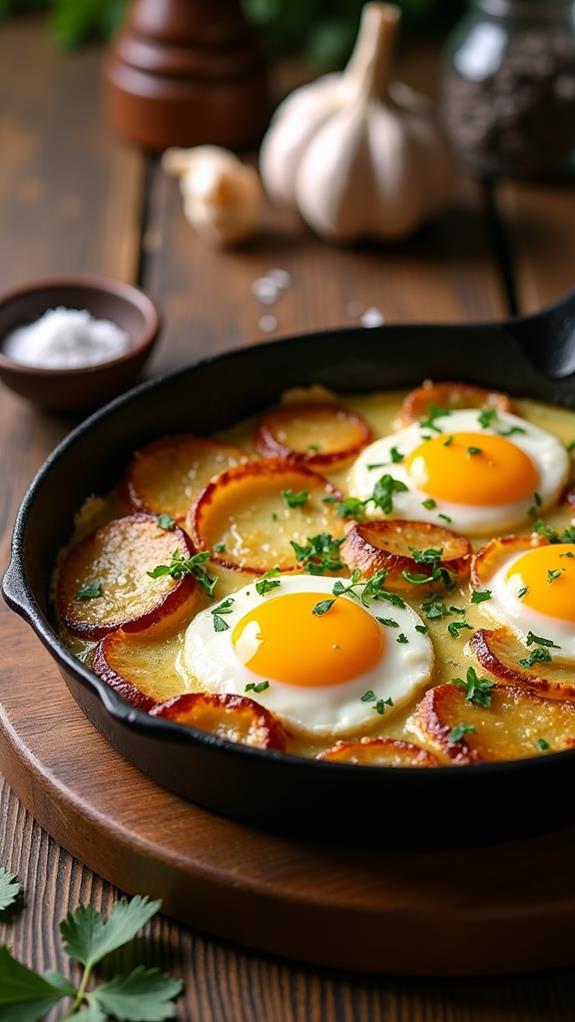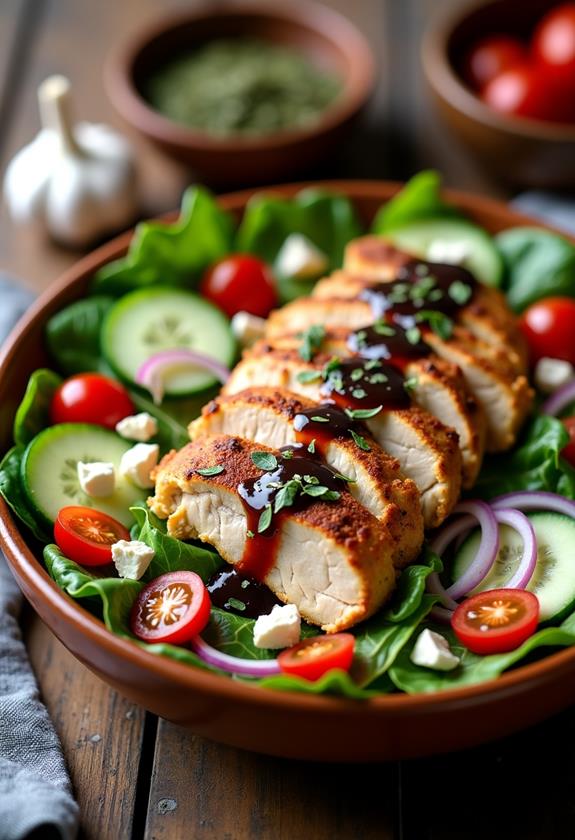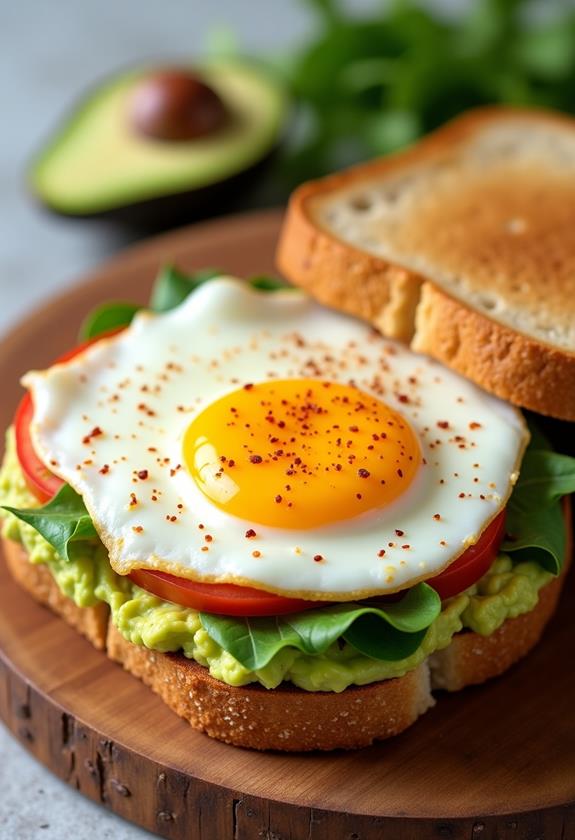Lebanese Potato And Egg Recipe

There’s something magical about the simplicity of Lebanese home cooking, and nothing exemplifies this better than the beloved potato and egg dish known as “Batata wa Bayd.” This humble yet incredibly satisfying recipe transforms just a handful of basic ingredients into a golden, flavorful meal that has graced Lebanese tables for generations.
I’ve fallen in love with this dish because it perfectly captures the essence of Mediterranean comfort food – simple, wholesome, and absolutely delicious. Whether you’re looking for a quick weeknight dinner or a hearty breakfast option, this Lebanese potato and egg recipe will become your new go-to comfort meal.
What is Lebanese Potato and Egg (Batata wa Bayd)?
Lebanese Potato and Egg, or “Batata wa Bayd” in Arabic, is a traditional Middle Eastern dish that combines thinly sliced potatoes with perfectly scrambled eggs. This rustic one-pan meal is seasoned with aromatic spices and fresh herbs, creating layers of flavor that are both comforting and sophisticated.
The dish originated as a peasant food, designed to make the most of simple, affordable ingredients. Lebanese families have been preparing this recipe for centuries, often serving it with fresh pita bread, yogurt, and pickled vegetables. What makes this dish special is how the potatoes are cooked until golden and crispy on the outside while remaining tender inside, then gently folded with creamy scrambled eggs.
The beauty of Batata wa Bayd lies in its versatility – it can be enjoyed for breakfast, lunch, or dinner, and each family often has their own special twist on the classic preparation.
Ingredients List for Lebanese Potato and Egg
- 4 large russet or Yukon Gold potatoes, peeled and thinly sliced
- 6 large eggs
- 1/4 cup olive oil (preferably extra virgin)
- 1 medium onion, thinly sliced
- 3 cloves garlic, minced
- 1 teaspoon ground cumin
- 1/2 teaspoon ground coriander
- 1/2 teaspoon paprika
- 1/4 teaspoon turmeric
- 1/2 teaspoon salt (or to taste)
- 1/4 teaspoon black pepper
- 1/4 teaspoon red pepper flakes (optional)
- 2 tablespoons fresh parsley, finely chopped
- 1 tablespoon fresh mint, chopped (optional)
- 2 tablespoons water or chicken broth
How to Cook Lebanese Potato and Egg: A Step-by-Step Guide
Creating the perfect Lebanese Potato and Egg requires patience and attention to detail. Here’s my comprehensive guide to ensure your dish turns out authentic and delicious every time:
1. Prepare the Potatoes:
- Wash and peel the potatoes thoroughly, then slice them into thin rounds about 1/4 inch thick.
- Rinse the sliced potatoes in cold water to remove excess starch, then pat them completely dry with paper towels.
- This step is crucial for achieving the perfect golden, crispy texture we’re after.
2. Heat the Oil:
- In a large, heavy-bottomed skillet or cast-iron pan, heat the olive oil over medium heat.
- The oil should be hot but not smoking – you’ll know it’s ready when a small piece of potato sizzles immediately upon contact.
- Using enough oil is important for proper browning and preventing sticking.
3. Cook the Potatoes:
- Carefully add the potato slices to the hot oil in a single layer, working in batches if necessary.
- Don’t overcrowd the pan, as this will cause the potatoes to steam rather than fry.
- Cook for 4-5 minutes on the first side until golden brown, then flip each slice carefully.
- Continue cooking for another 3-4 minutes until both sides are beautifully golden and the potatoes are tender inside.
4. Add the Aromatics:
- Push the potatoes to one side of the pan and add the sliced onions to the empty space.
- Cook the onions for 2-3 minutes until they begin to soften and become translucent.
- Add the minced garlic and cook for another 30 seconds until fragrant.
- Gently mix the onions and garlic with the potatoes.
5. Season the Mixture:
- Sprinkle the cumin, coriander, paprika, turmeric, salt, pepper, and red pepper flakes over the potato mixture.
- Toss everything gently to ensure the spices coat all the ingredients evenly.
- The spices should become fragrant and toasted, which takes about 1 minute.
6. Prepare the Eggs:
- In a separate bowl, whisk the eggs with 2 tablespoons of water or chicken broth.
- This addition helps create fluffier, more tender eggs.
- Season the beaten eggs lightly with a pinch of salt and pepper.
7. Combine and Finish:
- Pour the beaten eggs over the seasoned potato mixture in the pan.
- Using a wooden spoon or spatula, gently stir and fold the eggs into the potatoes.
- Cook over low-medium heat, stirring occasionally, for 3-4 minutes until the eggs are just set but still creamy.
- Remove from heat and immediately sprinkle with fresh parsley and mint.
Substitutions and Variations
Lebanese cuisine is wonderfully adaptable, and this potato and egg recipe offers several delicious variations:
- Potatoes: Sweet potatoes can be substituted for a slightly sweeter flavor profile, or try a mix of regular and sweet potatoes.
- Eggs: For a lighter version, use a combination of whole eggs and egg whites, or try duck eggs for a richer taste.
- Oil: While olive oil is traditional, you can use avocado oil for a more neutral flavor or ghee for added richness.
- Vegetables: Add diced tomatoes, bell peppers, or zucchini for extra vegetables and color.
- Protein: Some families add crumbled Lebanese cheese (like jibneh) or small pieces of cooked lamb or beef.
- Herbs: Fresh cilantro, dill, or oregano can be used instead of or in addition to parsley and mint.
Common Mistakes to Avoid
Through years of making this dish, I’ve learned to avoid these common pitfalls:
- Not Drying the Potatoes: Wet potatoes will steam instead of getting crispy, resulting in a soggy texture.
- Overcrowding the Pan: This prevents proper browning and creates uneven cooking.
- Using Too High Heat: High heat will burn the outside while leaving the inside raw.
- Overcooking the Eggs: The eggs should remain creamy and soft, not dry and rubbery.
- Skipping the Resting Time: Let the finished dish rest for 2-3 minutes before serving to allow flavors to meld.
How to Serve Lebanese Potato and Egg
This versatile dish can be served in numerous ways depending on the time of day and occasion:
For Breakfast or Brunch: Serve alongside warm pita bread, labneh (Lebanese strained yogurt), sliced tomatoes, and cucumbers. A cup of strong Arabic coffee or mint tea completes this traditional morning meal.
For Lunch or Dinner: Pair with a fresh tabbouleh salad, hummus, and pickled turnips. The combination creates a well-balanced, satisfying meal that showcases the best of Lebanese cuisine.
As a Side Dish: This potato and egg preparation works beautifully as a side dish alongside grilled meats, roasted chicken, or fish.
Presentation Ideas for Lebanese Potato and Egg
To make your Lebanese Potato and Egg as visually appealing as it is delicious:
- Family Style: Serve directly from the cooking pan for a rustic, homey presentation that’s perfect for casual family meals.
- Individual Portions: Divide into individual shallow bowls and garnish each with a sprinkle of sumac and fresh herbs.
- Colorful Garnish: Top with thin slices of radish, cherry tomatoes, or pickled vegetables for added color and crunch.
- Bread Presentation: Serve with warm pita triangles arranged around the edges of the serving dish.
Lebanese Potato and Egg Recipe Tips
Here are my tried-and-true tips for perfecting this beloved dish:
- Choose the Right Potatoes: Waxy potatoes like Yukon Gold hold their shape better during cooking, while russets create a fluffier interior.
- Temperature Control: Keep the heat at medium to ensure even cooking without burning the spices.
- Fresh Spices Matter: Use freshly ground spices when possible for the most aromatic and flavorful results.
- Timing is Everything: Add the eggs when the potatoes are perfectly golden but still hot – this helps create the ideal texture.
- Rest Before Serving: Allow the dish to sit for a few minutes after cooking to let the flavors settle and the eggs finish cooking from residual heat.
How to Store Lebanese Potato and Egg
Proper storage ensures you can enjoy leftovers safely and deliciously:
Allow the dish to cool to room temperature within 2 hours of cooking. Transfer to an airtight container and refrigerate for up to 3 days. The potatoes may lose some of their crispiness when stored, but the flavors will remain delicious.
For reheating, use a skillet over low heat with a splash of olive oil to help restore some crispiness to the potatoes. Avoid microwaving if possible, as it can make the texture rubbery.
Frequently Asked Questions (FAQs)
Q: Can I make Lebanese Potato and Egg ahead of time?
A: While this dish is best enjoyed fresh, you can prepare the potatoes and onions ahead of time and store them in the refrigerator. Add the eggs just before serving for the best texture.
Q: What’s the best type of potato to use?
A: Yukon Gold potatoes are my top choice because they hold their shape well and have a naturally buttery flavor. Russets work well too and create a fluffier interior.
Q: Can I make this dish without eggs?
A: Absolutely! The spiced potatoes alone make a delicious side dish. You could also substitute the eggs with crumbled tofu seasoned with turmeric for a vegan version.
Q: How do I prevent the potatoes from sticking?
A: Make sure your pan is properly heated and well-oiled before adding the potatoes. Don’t move them too early – let them develop a golden crust before flipping.
Q: Can I add cheese to this recipe?
A: Yes! Crumbled feta, Lebanese white cheese, or even a mild goat cheese can be added just before the eggs are fully set for extra richness.
Q: Is this dish gluten-free?
A: Yes, this recipe is naturally gluten-free, making it perfect for those with gluten sensitivities or celiac disease.
Conclusion
Lebanese Potato and Egg represents everything I love about Middle Eastern cooking – it’s simple, nourishing, and absolutely bursting with flavor. This humble dish proves that you don’t need expensive ingredients or complicated techniques to create something truly special.
The combination of perfectly golden potatoes, aromatic spices, and creamy eggs creates a harmony that’s both comforting and satisfying. Whether you’re new to Lebanese cuisine or grew up eating this dish, I guarantee this recipe will become a cherished addition to your cooking repertoire.
I encourage you to make this recipe your own by experimenting with different spice combinations or adding your favorite vegetables. The beauty of traditional cooking lies in its adaptability, and each family’s version tells its own delicious story.
So gather your ingredients, heat up that pan, and prepare to fall in love with one of Lebanon’s most beloved comfort foods. Your kitchen will smell amazing, and your taste buds will thank you for this authentic culinary adventure. Happy cooking!






